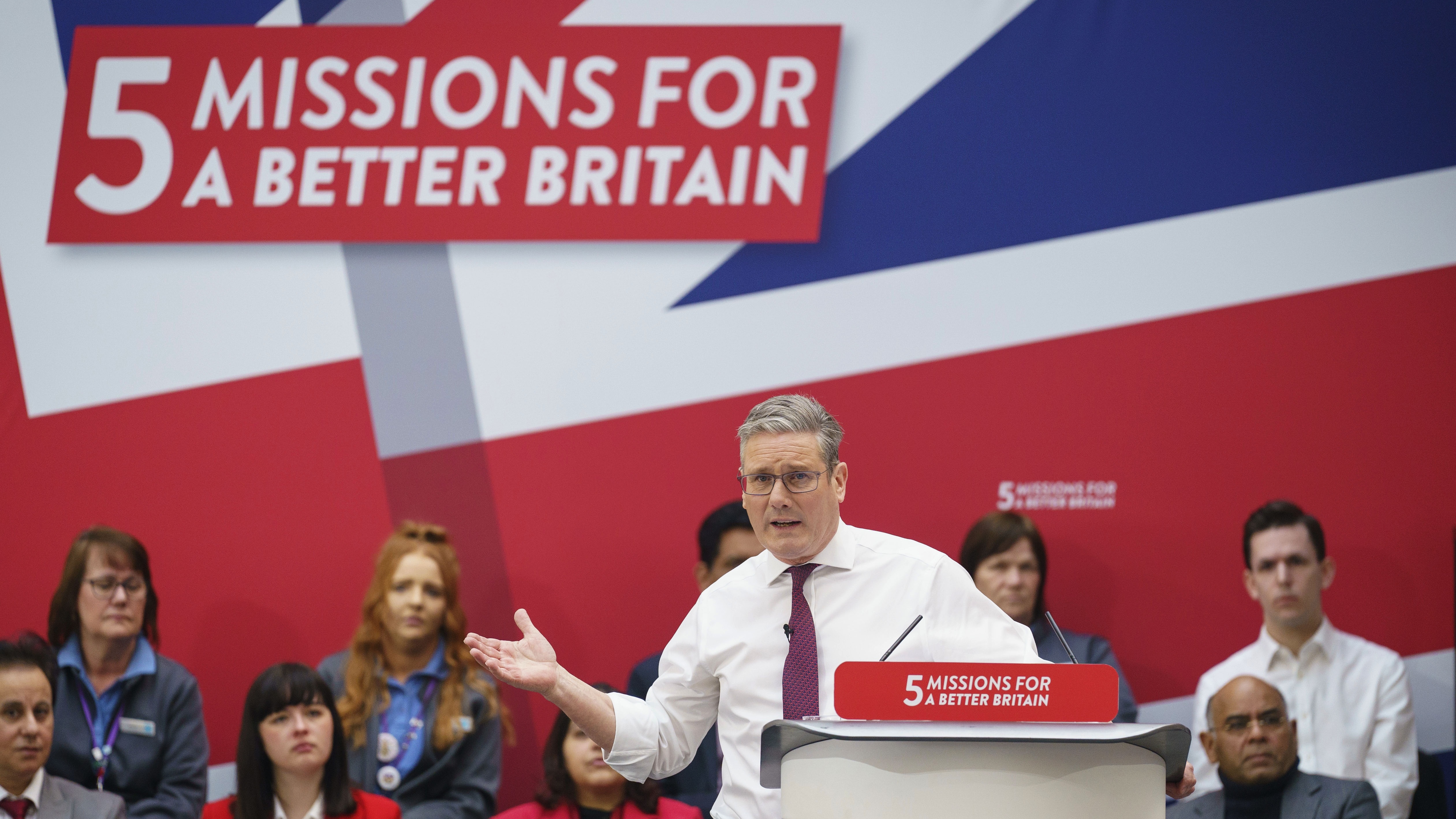Keir Starmer’s five missions for government: proper policies or pure politics?
As Labour get closer to power it has become hard to know what their leader stands for, say commentators

A free daily email with the biggest news stories of the day – and the best features from TheWeek.com
You are now subscribed
Your newsletter sign-up was successful
The battle lines for next year’s general election are being drawn, said Andrew Grice in The Independent. In January, Rishi Sunak published his five pledges (halving inflation, growing the economy, reducing public debt, cutting NHS waiting lists and stopping the Channel migrants). Last week, Keir Starmer followed suit with a speech in Manchester in which he set out Labour’s “five missions”.
Starmer “hates” being in opposition, said Ben Nunn in The i Paper. “He finds it painfully frustrating.” He’s impatient for power, and he has a very clear idea of what he’d do with it. He “knows from history that the most transformative governments are in it for the long haul”. This is what we saw last week, a two-term plan focused on missions: he wants Britain to have the highest sustained economic growth of any G7 nation; he wants it to be a “clean energy superpower”.
‘We learnt nothing about his real views’
He wants a better NHS, safer streets, and to break down the barriers to opportunity by reforming childcare and education. “But who’s not in favour of those things,” asked the Daily Mail. “He may as well say he wants the Sun to shine for longer.” Beyond platitudes and waffle – he says he wants government to be “more agile, empowering and catalytic” – there was no clue as to how he’d actually achieve or pay for any of it.
The Week
Escape your echo chamber. Get the facts behind the news, plus analysis from multiple perspectives.

Sign up for The Week's Free Newsletters
From our morning news briefing to a weekly Good News Newsletter, get the best of The Week delivered directly to your inbox.
From our morning news briefing to a weekly Good News Newsletter, get the best of The Week delivered directly to your inbox.
We learnt nothing, either, about his real views on many important issues. “Illegal small boat migrants? Silence. The housing crisis? Silence. The definition of a woman? Silence.” I’ve often wondered why Starmer is so boring, said Camilla Tominey in The Daily Telegraph. And I’ve concluded that it may be “an intelligent ruse” to distract us from the fact that he keeps “changing his mind on things”.
In 2019, for instance, he joined “the howls of Labour outrage” over the stripping of Shamima Begum’s citizenship. Yet by last week, he’d completely changed his tune. When he campaigned for the leadership, he promised to respect Jeremy Corbyn’s legacy, and to abolish tuition fees and renationalise utilities; Corbyn has now been purged and the policies ditched.
‘He’s laying a solid foundation’
The point is that “when the facts change, then policies must change too”, said Polly Toynbee in The Guardian. “Since Starmer made those pledges, there have been Covid, Ukraine and the Liz Truss ‘kamikaze’ Budget.” With energy prices sky-high, it’s not a priority to spend a fortune buying back privatised utilities. There are probably 18 months until the election. There’s no need for Starmer to give us detailed policies now. Instead, he’s outlining his principles, laying a solid foundation. “Sir Keir’s problem is that his principles are exactly what the public is coming to doubt after so many U-turns,” said The Times.
Although the party is still 20 or so points ahead of the Tories in the polls, there is evidence that this is a “vulnerability”: given the choice, voters prefer Rishi Sunak to him; they still don’t quite know what he stands for. To win, he “will need policies, rather than missions”.
A free daily email with the biggest news stories of the day – and the best features from TheWeek.com
-
 Bad Bunny’s Super Bowl: A win for unity
Bad Bunny’s Super Bowl: A win for unityFeature The global superstar's halftime show was a celebration for everyone to enjoy
-
 Book reviews: ‘Bonfire of the Murdochs’ and ‘The Typewriter and the Guillotine’
Book reviews: ‘Bonfire of the Murdochs’ and ‘The Typewriter and the Guillotine’Feature New insights into the Murdoch family’s turmoil and a renowned journalist’s time in pre-World War II Paris
-
 Witkoff and Kushner tackle Ukraine, Iran in Geneva
Witkoff and Kushner tackle Ukraine, Iran in GenevaSpeed Read Steve Witkoff and Jared Kushner held negotiations aimed at securing a nuclear deal with Iran and an end to Russia’s war in Ukraine
-
 Democrats push for ICE accountability
Democrats push for ICE accountabilityFeature U.S. citizens shot and violently detained by immigration agents testify at Capitol Hill hearing
-
 Fulton County: A dress rehearsal for election theft?
Fulton County: A dress rehearsal for election theft?Feature Director of National Intelligence Tulsi Gabbard is Trump's de facto ‘voter fraud’ czar
-
 ‘Melania’: A film about nothing
‘Melania’: A film about nothingFeature Not telling all
-
 The Mandelson files: Labour Svengali’s parting gift to Starmer
The Mandelson files: Labour Svengali’s parting gift to StarmerThe Explainer Texts and emails about Mandelson’s appointment as US ambassador could fuel biggest political scandal ‘for a generation’
-
 Greenland: The lasting damage of Trump’s tantrum
Greenland: The lasting damage of Trump’s tantrumFeature His desire for Greenland has seemingly faded away
-
 Minneapolis: The power of a boy’s photo
Minneapolis: The power of a boy’s photoFeature An image of Liam Conejo Ramos being detained lit up social media
-
 The price of forgiveness
The price of forgivenessFeature Trump’s unprecedented use of pardons has turned clemency into a big business.
-
 Will Peter Mandelson and Andrew testify to US Congress?
Will Peter Mandelson and Andrew testify to US Congress?Today's Big Question Could political pressure overcome legal obstacles and force either man to give evidence over their relationship with Jeffrey Epstein?